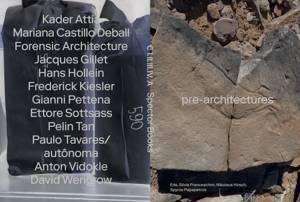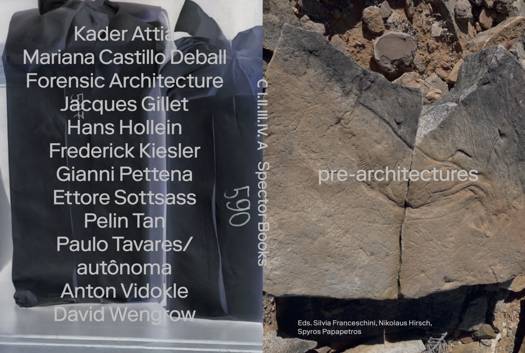
- Afhalen na 1 uur in een winkel met voorraad
- Gratis thuislevering in België vanaf € 30
- Ruim aanbod met 7 miljoen producten
- Afhalen na 1 uur in een winkel met voorraad
- Gratis thuislevering in België vanaf € 30
- Ruim aanbod met 7 miljoen producten
Zoeken
Pre-Architectures
Silvia Franceschini, Nikolaus Hirsch, Spyros Papapetros, David Wengrow
Paperback | Engels
€ 11,95
+ 23 punten
Omschrijving
Envision a world without architecture, a world-tecture without arche, the latter meaning not only beginning or origin but also the authority to arrange and subordinate persons, objects, and processes into an identifiable power structure. Pre-architecture is not simply "not architecture"-it is what architecture could have become but ultimately disavowed. The same unfulfilled potentialities haunt not only the distant past but also architecture's anxious present in a time of environmental crisis, energetic transformation, and related social challenges. The publication, which accompanies the exhibition of the same name in Brussels, refers to the beginnings of human habitat and features a transdisciplinary field of architects, artists, sociologists, and archaeologists. Speculating on the "birth" of design, it questions the cultural, social, economic, and political foundations of spatial organization.Silvia Franceschini is a curator at CIVA in Brussels. Previously, she was a curator at Z33 House for Contemporary Art, Design, and Architecture, Hasselt. Nikolaus Hirsch is artistic director of CIVA, Brussels. He has previously held the positions of dean at the Städelschule, Frankfurt, and director of Portikus Kunsthalle, Frankfurt. Spyros Papapetros teaches art and architectural theory and historiography at the School of Architecture and the Programs on Media and Modernity as well as European Cultural Studies at Princeton University.
Specificaties
Betrokkenen
- Auteur(s):
- Uitgeverij:
Inhoud
- Aantal bladzijden:
- 88
- Taal:
- Engels
Eigenschappen
- Productcode (EAN):
- 9783959058742
- Verschijningsdatum:
- 21/01/2025
- Uitvoering:
- Paperback
- Afmetingen:
- 115 mm x 8 mm
- Gewicht:
- 94 g

Alleen bij Standaard Boekhandel
+ 23 punten op je klantenkaart van Standaard Boekhandel
Beoordelingen
We publiceren alleen reviews die voldoen aan de voorwaarden voor reviews. Bekijk onze voorwaarden voor reviews.











